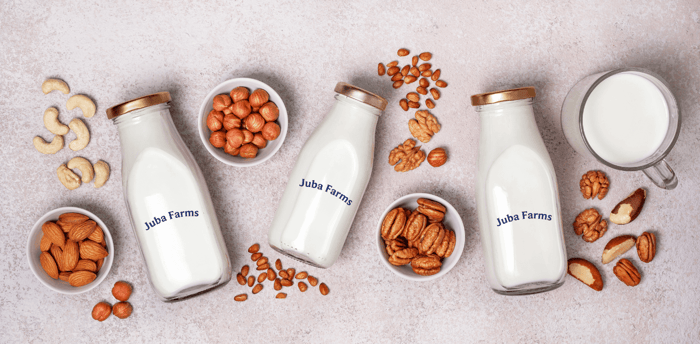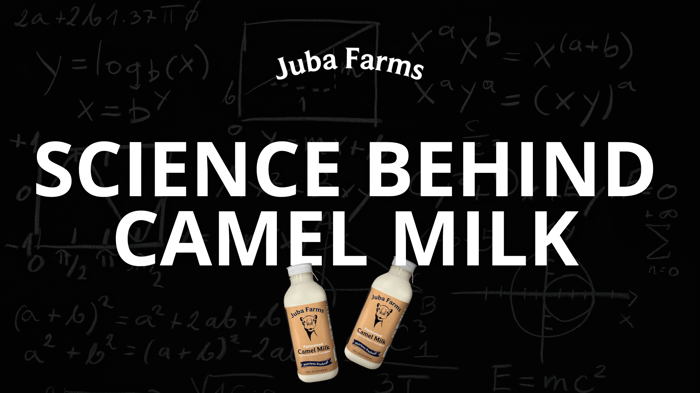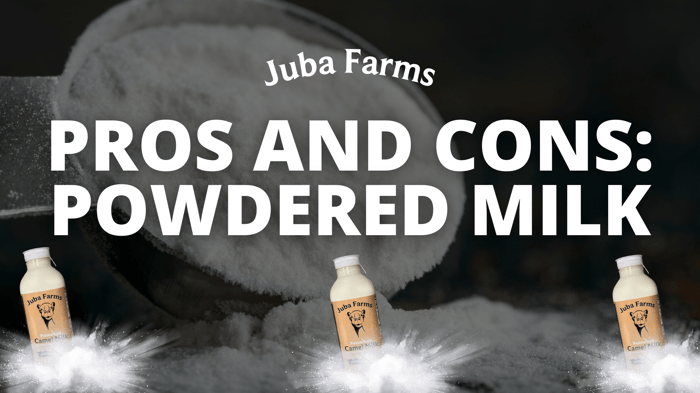Table of Contents
- Camel Milk vs. Cow Milk: What’s the Difference?
- The Nutritional Powerhouse of Camel Milk
- Camel Milk and Diabetes: What are the Details?
- Immune Boosting Properties
- Camel Milk for Gut Health
- Camel Milk and Digestive Tolerance
- Additional Health Benefits of Camel Milk
- How to Incorporate Camel Milk into Your Diet
- Why Choose Juba Farms for Your Camel Milk?
- Is Camel Milk Worth Trying?
Growing up, my parents always talked about the incredible benefits of camel milk. They grew up drinking it as part of their diet in Somalia, but it's not as accessible here in the U.S. I was skeptical, but my curiosity led me on a journey of finding camel farmers and digging deep into the science behind camel milk. I read through many research papers and published studies. What I discovered was astonishing.
Research on camel milk is growing, revealing its potential health benefits, unique nutritional profile, and surprising impact on various conditions. If you’ve ever wondered what makes camel milk special, you're in the right place. Let’s explore the science behind this fascinating superfood and why so many people are making the switch.

Camel Milk vs. Cow Milk: What’s the Difference?
Many assume that all animal milks are the same, but camel milk is quite different from cow milk in several ways:
Lower lactose content: While not lactose-free, camel milk is often easier to digest for those with lactose intolerance.
Rich in healthy fats: Unlike cow milk, camel milk contains a high level of unsaturated fatty acids, which are beneficial for heart health.
No A1 casein: Many people struggle with A1 casein in cow milk, which can cause digestive discomfort. Camel milk contains only A2 casein, making it easier on the stomach.
Better suited for hot climates: Camel milk stays fresh longer due to its natural antibacterial properties.
The Nutritional Powerhouse of Camel Milk
Research on the science behind camel milk highlights its impressive nutritional profile. It is loaded with essential vitamins and minerals, including:
Vitamin C: Camel milk contains three times more vitamin C than cow milk, boosting immunity.
Iron: An important mineral for preventing anemia, especially in children and pregnant women.
Calcium and magnesium: Essential for bone health and preventing osteoporosis.
Immunoglobulins and lactoferrin: These proteins help strengthen the immune system.
B Vitamins: Necessary for energy production and nervous system function.
Camel Milk and Diabetes: What are the Details?
Disclaimer: These statements have not been evaluated by the Food and Drug Administration. This product is not intended to diagnose, treat, cure, or prevent any disease.
One of the most fascinating areas of camel milk research focuses on diabetes. Studies suggest that camel milk can help regulate blood sugar levels due to:
Insulin-like proteins: Camel milk naturally contains insulin-like proteins that may help improve glucose metabolism.
Lower glycemic impact: Compared to cow milk, camel milk has a lower impact on blood sugar levels.
A study published in Diabetes Research and Clinical Practice found that regular consumption of camel milk significantly reduced insulin requirements in people with Type 1 diabetes. While more research is needed, these findings are promising.
Immune Boosting Properties
Disclaimer: These statements have not been evaluated by the Food and Drug Administration. This product is not intended to diagnose, treat, cure, or prevent any disease.
The science behind camel milk suggests it has long been used in Middle Eastern and African cultures as a natural immune booster. The reason? It’s packed with:
Lactoferrin: Known for its antibacterial and antiviral properties.
Immunoglobulins: Support the immune system and may help combat infections.
Zinc and Selenium: Two minerals critical for immune function.
Some studies suggest that camel milk may even help manage autoimmune disorders by modulating the immune system’s response.
Camel Milk for Gut Health
Disclaimer: These statements have not been evaluated by the Food and Drug Administration. This product is not intended to diagnose, treat, cure, or prevent any disease.
The science behind camel milk also returns some research on gut health. If you struggle with digestion issues, camel milk may be worth looking into. Its benefits for gut health include:
Probiotic properties: Supports a healthy gut microbiome.
A2 casein: Easier to digest than the A1 casein found in cow milk.
Anti-inflammatory effects: May help with conditions like IBS and leaky gut syndrome.
Alkaline pH: Helps reduce acid reflux symptoms.
Camel Milk and Digestive Tolerance
The science behind camel milk continues to highlight its remarkable benefits, especially for digestive health. Many people turn to camel milk as an alternative to cow milk due to its superior digestibility. Unlike traditional dairy, camel milk contains only A2 beta-casein, which is considered easier on the gut compared to A1 beta-casein, the dominant protein in most cow milk varieties. This difference may contribute to reduced inflammation and better overall tolerance.
Additionally, while camel milk is not completely lactose-free, it contains lower lactose levels than cow milk, making it a promising option for individuals with mild lactose intolerance. Many people who experience bloating, discomfort, or digestive distress from conventional dairy find that camel milk is gentler on their stomach.
Emerging research on the science behind camel milk suggests that its unique protein composition and enzyme content may further support digestive health. Some studies indicate that camel milk helps promote beneficial gut bacteria, enhances nutrient absorption, and may even aid in reducing gut inflammation. This makes camel milk an intriguing, research-backed alternative for those looking for a natural, easily digestible dairy option.
For individuals who struggle with conventional dairy, camel milk presents a digestive-friendly solution backed by both tradition and modern science.
Additional Health Benefits of Camel Milk
Beyond the benefits mentioned above, camel milk is also being researched for its potential effects on:
Skin health: Due to its high levels of alpha-hydroxy acids, camel milk may support skin hydration and anti-aging.
Allergy relief: Some people with dairy allergies find that they can tolerate camel milk better than cow milk.
Heart health: Thanks to its high unsaturated fat content, camel milk may support cardiovascular wellness.

How to Incorporate Camel Milk into Your Diet
Adding camel milk to your diet is easy. Here are a few ways to enjoy it:
Drink it straight: It has a slightly salty, refreshing taste.
Blend it into smoothies: Pairs well with fruits and honey.
Use it in coffee or tea: A great alternative to regular milk.
Make yogurt or kefir: A probiotic-rich treat for gut health.
Cook with it: Use camel milk in soups, sauces, and baking.
Why Choose Juba Farms for Your Camel Milk?
Finding high-quality camel milk can be a challenge, but Juba Farms makes it easy. Here’s why they stand out:
100% pure camel milk: No additives, just natural goodness.
Affordable pricing: The best prices in the U.S. without compromising quality.
Commitment to accessibility: Ensuring everyone can enjoy the benefits of camel milk.
Sourced from ethical farms: High standards of animal care and sustainability.
Is Camel Milk Worth Trying?
Based on the research and the science behind camel milk, the answer is a resounding yes! Camel milk has sustained nomads for generations, and that itself is a testament to the incredible benefits' camel milk has to offer.
With its rich history, nutritional benefits, and growing scientific backing, camel milk is more than just a trendy alternative—it’s a true superfood.
If you’re ready to experience the benefits for yourself, check out Juba Farms today. We guarantee you the best price in the U.S. and are committed to our customer first mission of making camel milk more accessible all across the United States.








